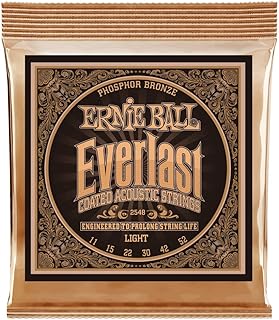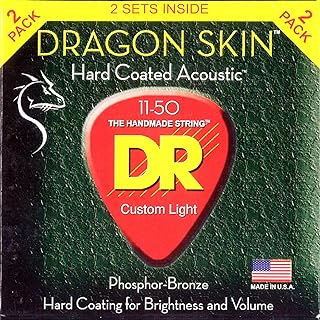
Elixir manufactures 80/20 and Phosphor Bronze Coated Guitar Strings. Both types are bronze, which means they are both copper alloys. With 80/20 strings, 80 refers to percentage copper and 20 is percent zinc, while phosphor bronze has higher copper content mixed with tin phosphide.
With non-coated strings the sound changes with age. On the other hand, coated strings will retain their sparkle longer and supposedly start to deteriorate as the coatings wear off. Although more expensive to buy, most people probably keep them on their guitars longer.
Looking for electric guitar blues strings? Check these out.
Coated Guitar Strings
WARNING! This site may receive a small commission if you decide to buy using links on this page. If you do buy, you are so cool! Thank you.
Traditional guitar strings corrode and degrade due to sweat and oils from the hands, and due to the environment. However, coated strings offer longer life while maintaining their tonal qualities by using a durable protective layer.

Elixir was a pioneer in this area and they offer durable strings that keep their fresh sound for longer than traditional ones. Their coated strings, include Elixir 80/20 and Phosphor Bronze, each with their distinct tonal characteristics appealing to different musicians.

In addition to Elixir, other prominent brands have ventured into producing coated guitar strings. D’Addario with their EXP coated strings, Ernie Ball‘s Paradigm series, and DR Strings‘ VERITAS line are popular alternatives.
These brands use various proprietary coating technologies to enhance string longevity while attempting to preserve the natural tone and feel of the instrument.
Compare Elixir 80/20 vs Phosphor Bronze
To showcase the differences between Elixir 80/20 and Phosphor Bronze strings, listen closely to this video. It can help you decide which may be best for you.
The only way to really decide which strings are best for you is to try them. It’s more than just the sound, it’s also about how the strings make you feel. With coated strings you can expect that new string sparkle and feel to last longer.
What’s in the Coating?
The technology behind coated strings often involves applying a microscopically thin polymer layer over the wound strings, acting as a barrier against corrosion, dirt, and oil. This shields the string surface from elements that would typically cause corrosion and dullness, resulting in an extended lifespan and consistent tone.
Disadvantages of Coated Strings
Highlighting aspects such as tonal warmth, brightness, sustain, and resistance to corrosion in different playing environments could provide valuable insights for guitarists looking to choose between these two popular options.
However, despite their numerous advantages, coated strings do have a few downsides. Some players argue that the coating might slightly alter the natural sound and feel of the strings compared to their uncoated counterparts. Additionally, coated strings tend to be more expensive than regular strings, which can be a drawback for musicians on a budget.
Ultimately, the choice between coated and uncoated strings boils down to personal preference and playing style. Some players swear by the longevity and consistent performance of coated strings, while others prefer the natural feel of uncoated strings. A thorough understanding of these nuances can help guitarists make informed decisions about which strings best suit their playing needs and preferences.


